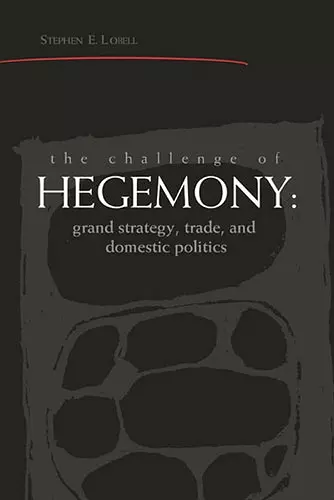The Challenge of Hegemony
Grand Strategy, Trade, and Domestic Politics
Format:Paperback
Publisher:The University of Michigan Press
Published:23rd Mar '05
Currently unavailable, our supplier has not provided us a restock date

The Challenge of Hegemony explains how international forces subtly influence foreign, economic, and security policies of declining world powers. Using detail-rich case studies, this sweeping study integrates domestic and systemic policy to explain these countries' grand strategies. The book concludes with a discussion of the implications for the future of American foreign policy.
"His conceptually rigorous and tightly reasoned study . . . reminds us that power is never value neutral but organizes commercial systems in liberal or imperial terms."
---Perspectives on Politics
"Lobell's book is tightly written, nicely argued and thoroughly researched to a fault. He seems to delight in historical detail. The complexity of his approach is refreshing."
---International Affairs
"The Challenge of Hegemony is a pleasure to read. It is both theoretically sophisticated and empirically rich."
---International Studies Review
"The Challenge of Hegemony offers a compelling reinterpretation of key historical cases and provides wise guidance as to how the United States should wield its power today."
--Charles A. Kupchan, Council on Foreign Relations
"Lobell demonstrates clearly how the international environment confronting great powers interacts with their domestic political coalitions to produce different grand strategies. Through a masterful sweep of history, Lobell shows us the alternative trajectories before the United States today."
--David A. Lake, University of California, San Diego
"By examining how systemic and domestic forces interact in shaping economic policy, Lobell makes an innovative and important contribution to the literature on grand strategy. The Challenge of Hegemony offers a compelling reinterpretation of key historical cases and provides wise guidance as to how the United States should wield its power today."
—Charles A. Kupchan, Council on Foreign Relations
"Lobell demonstrates clearly how the international environment confronting great powers interacts with their domestic political coalitions to produce different grand strategies. Through a masterful sweep of history, Lobell shows us the alternative trajectories before the United States today."
—David A. Lake, University of California, San Diego
". . . tightly written, nicely argued and thoroughly researched to a fault. [Lobell] seems to delight in historical detail. The complexity of his approach is refreshing."
—International Affairs
". . . a pleasure to read. It is both theoretically sophisticated and empirically rich. Theoretically, it makes an innovative argument that draws constructively from the subfields of comparative politics and international political economy to explain the national security behavior of leading states. . . . [A] significant work that makes an innovative and important contribution to the international relations literature on hegemonic stability and power transition theory. It is, therefore, essential reading for both scholars and graduate students. In addition, Lobell's discussion of the grand strategic policy dilemmas facing the United States in the contemporary era will be of great interest to the U.S. policy community."
—International Studies Review
"[A] conceptually rigorous and tightly reasoned study. . . . Lobell reminds us that power is never value neutral but organizes commercial systems in liberal or imperial terms. Even more importantly, power organizes political societies in liberal (democratic) or imperial (authoritarian) terms."
—Perspectives on Politics
ISBN: 9780472030804
Dimensions: unknown
Weight: unknown
256 pages